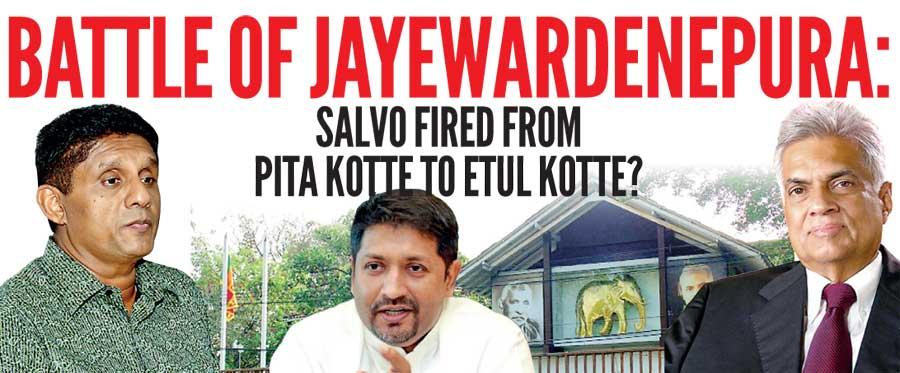Reply To:
Name - Reply Comment

With headquarters located in Pita Kotte and Etul Kotte, and Camped on either side of AlakesvaraRampart, the two factions of UNP have declared war. Ranil faction holds the fort at Pita Kotte junction while Sajith positioned at E. W. Perera Mawatha. [named after national hero ‘Lion of Kotte,’ who lost to JR Jayewardene at 1947 elections]. 
Kotte was developed by Nissanka Alakesvara as a military fortress in the late 14th century with inner city or Etul Kotte and an outer city, Pita Kotte. The inner area was surrounded by a rampart with a wide hole dug all the way around the castle and filled with water at the South and bounded by the lake; while the Pita Kotte area fortified by rampart. The rampart of the Etul Kotte was built by King Parakramabahu the sixth. The first ever ‘Battle of Kotte’ was fought with forces of the Chinese Ming dynasty and the Sinhalese king of Kotte, when China’s fleet returned to Ceylon in 1410. It resulted in the overthrow of King Alakeshvara.
As very correctly explained by soft-spoken and sensible politician Ruwan Wijewardene, the former MP who chose to remain with the party irrespective of individual preferences, that Sajith group overrated their capabilities by comparing them with Mahinda Rajapaksa. Mahinda branching off from SLFP Forming the powerful SLPP has reduced the old SLFP to a minnow. Charisma and popularity of Mahinda is far superior to that of Sajith. What Rajapaksas can do with Sirisena is far greater to that of Premadasa against Wickremasinghe. The UNP working committee’s approval of the suspension of the membership of Sajith Premadasa, its deputy leader and 98 other former ministers, MPs, and electoral organisers, who handed over a separate nomination list under a new party has widened the rift between the two factions, and the breakaway group is now struggling because they over-estimated their position by trying to emulate the inimitable Rajapakasas. Obviously one cannot claim membership of two different political parties at the same time.
Politicians tend to make comparisons as a basis for their sense of self-esteem. Their expertise and disposition for competence depend on charisma and efficiency. Personality of a leader is a combination of respect for him as well as liking, they are often in conflict. According to Wijewardene, the membership of 99 UNPers will only be suspended, meaning there is an opportunity for them to submit their explanation in writing on the decision to contest from another party. But some of the rebels openly criticized the leadership over the issue.
Among the suspended are senior members like: Harsha de Silva, Sujeewa Senasinghe, Kabir Hashim, Gayantha Karunatilleke Ranjith Madduma Bandara, Lakshman Kiriella and Mangala Samaraweera. “These members have been suspended on the basis that they defied the party’s decision to contest the general election under the elephant symbol,” Wijewardene said adding that the doors were still open for these members to rejoin the Party.
The WC had left out filling the post of Deputy Leader and the Chairman, two vital positions, while Akila Viraj Kariyawasma and Ravi Karunanayake had been re-appointed as General Secretary and Assistant Leader respectively. Also the WC has been re-constituted with six new faces included;Prof. Ashu Marasinghe, Palitha Thewaraperuma, Shanthini Kongahage, Sandith Samarasinghe, Nalaka Kolonna, Azmi Tashim and Chanka Illeperuma.
At a press conference held following their meeting held the same evening, at Etul Kotte headquarters, spokesmen for Samagi Jana Balavegaya, Kabir Hashim, a former UNP Chairman said, “We are still UNPers and we have decided to unite the UNP and to free it from the clutches of those who are involved in deals with the government,” Kiriella addressing the media said, “five President’s Counsel would appear on behalf of the UNPers whose party membership was suspended. We will start working from Sirikotha after the elections.”
The ‘five PCs’ talk reminds the 48 year-old Dudley-JR conflict in the grand old party.
The UNP’s biggest ever conflict arose in 1972, following its disastrous electoral defeat under Dudley Senanayake in 1970. A year later the JVP insurrection ’71, left tens of thousands of misguided youth and Policemen dead and caused immense destruction to the economy. This prompted the Deputy leader, JR Jayewardene who was leader of the opposition to propose a ‘co-operate with Sirimavo Bandaranaike’s government’ formula during the national disaster. The Sirimavo government’s media network gave maximum publicity to JR proposals creating divisions in the UNP and exposing tension between JR and Dudley. Parliamentary group and WC of the Party met under Dudley’s chairmanship on January 20, 1972 and rejected JR proposals, thus Dudley winning the battle of wits, and soon confident of winning the next, the war, expelling JR from the party.
JR continued with his call for co-operation with government, and openly criticized the leadership. Dudley moved swiftly to cut JR down to size. The first salvo was fired by M D Banda, a senior member at the WC meeting held on February 12, moved for the expulsion of JR Jayawardene. It was seconded and there was only one member who backed JR—A. C. S. Hameed. JR was totally isolated in the WC. A committee was appointed to inquire into the charges, whose report was submitted to WC which met on April 8. After reading the report a fresh motion was read out for the expulsion of party’s deputy leader, and it was decided to meet on 17th to make the final move, as JR was out of the island.
JR supporters organised a large crowd to be present at the airport to welcome him on his return, the same lot would assemble at party headquarters ‘Sirikotha’ on the day the WC meet to make its final decision. They did block all entrances to the building, preventing entry by the WC members. The old Sirikotha was located at Kollupitya, and the nation was under emergency: the police did not allow such unruly gathering. JR spoke to Srimavo PM, and ensured non-interference by the police. [Reminds one, Ranil’s appeal to President Rajapaksa in 2009, when Karu Jayasuriya and Sajith Premadasa supporters planned to surround the new Sirikotha at Pitakotte, while a WC of UNP meeting was on] In the meantime JR’s lawyers were busy doing the ground work for a legal battle. HW Jayewardene QC, JR’s brother retained the country’s foremost civil lawyers, the top five QCs to appear for JR. However, Jayewardene was advised by the team of lawyers, that legal action outside party walls would go against him; hence he will have to look for other options. To the surprise of many, instead of final parting of ways, reconciliation was affected by the end of May 1972. Paris Perera, a senior MP, volunteered to make peace; he summond both leaders to his private residence for talks, which finally ended the friction between feuding factions which lasted over six month.
The lagoons, streams, and marshes that still encircle Kotte will only provide a natural defence from outside elements. If fighting erupts within, both sides will be vanquished. Let good sense prevail; some peace-loving senior, like Ruwan Wijewardene can intervene in bringing the warring factions to a negotiating table and unify the party.